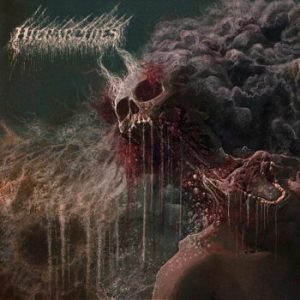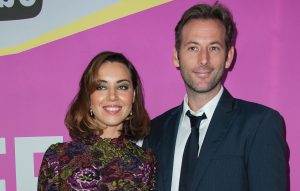The director of new documentary Marilyn Manson: Unmasked Karen McGann has spoken to NME about the upcoming three-part Channel 4 series that explores the musician’s rise to fame and allegations of abuse against him.
The docuseries was announced last week, with a press release explaining that it will “unravel the shocking story of one of rock music’s most polarising figures,” including “the chilling abuse allegations that have engulfed his career”.
In 2021, his former partner, the actor Evan Rachel Wood, accused Manson – real name Brian Warner – of grooming, abuse and manipulation. In 2022, she also claimed that Warner “essentially raped” her “on-camera” when they filmed the music video for his 2007 song ‘Heart-Shaped Glasses (When the Heart Guides the Hand)’.
After Wood’s initial statement, a number of other women made allegations against the musician. These included Game Of Thrones actor Esme Bianco, who filed a lawsuit alleging sexual assault, physical abuse and human trafficking.
Warner strongly denied the allegations, which he described as “horrible distortions of reality”. The singer countersued Wood for defamation and emotional distress. He dropped the lawsuit last November and agreed to pay her $327,000 in attorney fees. Warner and Bianco reached an out-of-court settlement in January 2023. Manson has since gone on to release the album ‘One Assassination Under God – Chapter 1’, and is soon to begin a supporting world tour.
As well as Wood, the new docuseries features alleged victim Bianca Allaine Kyne (who claims Warner subjected her to abuse, claims which he has denied) and former Marilyn Manson band member Stephen Bier.
Read our full interview below, where McGann tells NME about putting the doc together, the power of Manson’s image in his heyday, the changing culture of abuse allegations, and how the music industry should respond.
NME: Hi Karen. What challenges did you face in making Marilyn Manson: Unmasked?
Karen McGann: “There’s one thing speaking to a journalist, but it’s a whole other thing as a survivor, or someone who’s making very strong allegations, to decide to put yourself on camera telling that story. It was very hard for Rolling Stone to write [their 2021 investigation]; we found that people were even more reticent to go on the record. We approached a lot of people and ended up having a lot of off-the-record [conversations]. When people did speak, it was a long journey to translate those initial off-the-record conversations to on-camera appearances.”
Beyond the obvious, was there something specific that was deterring people?
“When the original story came out, there was a huge backlash and people trolling, saying that they were Manson fans, who just went after these girls in quite a strong way. [The accusers had] been burned by that experience, so the idea of doing it for a documentary felt really difficult. I’m really grateful to those who decided to come on the journey with us because there’s a lot of jeopardy involved for them.”
Marilyn Manson during 1997 MTV Video Music Awards at Radio City Music Hall in New York City, New York, United States. (Photo by Ke.Mazur/WireImage)
The series contains archive footage of Manson publicly saying things that are, in retrospect, totally unacceptable…
“Manson is a fascinating subject in that he is the architect of his own mythology. So there is an opinion that maybe this is just a construct and then there are others that tell you, ‘This is hiding in plain sight.’ The guiding principle for us, when we were making the documentary, was: ‘Did he say it? Yes, he did. We’ll show it to you and then you as the audience can make up your own mind.’ I really wanted to go, ‘I’m going to present you with the different sides of this thing and you can decide what you feel we as a society should do or not do about it.”
More recent allegations against Jay-Z, Russell Brand and Diddy relate to a similar time period. Were the ‘00s particularly toxic?
“I think there was something about the culture being kind of consciously provocative at that time that a lot of us invested in. We felt like, ‘This is ironic. This is about rejecting the establishment or conservative values in some way. Of course we don’t mean it – we’re just saying it for effect.’ [Now] it’s a question of asking: are there people who hide in plain sight and take advantage of that to play out their own values and desires?”
It was also the last hurrah for the music business before the internet decimated profit margins. Perhaps, in general, the industry protected figures who were profitable…
“Totally. People are always protected when they’re making money and that’s one of the hypocrisies, sometimes, of the entertainment industry. We’ve seen that with [Harvey] Weinstein. In the last few years, people have been asking: ‘Is there going to be a #MeToo for the music industry?’ Since we made the Manson documentary, all the allegations against Diddy have come out. Maybe [the music industry’s #MeToo] will happen.”
One lawsuit included a claim against Manson’s former label Interscope and its now-defunct subsidiary Nothing Records for “protecting, promoting, and profiteering from” his alleged conduct. Was that a watershed moment?
“It does raise knotty questions for record companies, because I think when you bring an artist [to the public], there are bigger ideological questions about companies who are profiting from artists who have allegations against them and whose work is provocative in that way. Should they be responsible or not? It will be interesting to see if that’s going to gain traction. If [that claim] goes to court, that’s major.”
What kinds of questions should record labels now be asking themselves?
“I think record companies are perhaps not keen to open the door to all of this. I would hope that things are happening behind closed doors, even if it’s only out of self-interest and self-preservation, to make sure their house is in good order.”
Are you surprised more alarm bells weren’t raised about Manson in his heyday?
“No. Since what was normalised 20 years ago, we’ve come so far in terms of what is and isn’t acceptable. We have a greater understanding in terms of what is coercive or abuse; you slightly shift and tilt the lens. #MeToo was a huge moment and I think we’re still trying to grapple with the ramifications of. Without #MeToo and what happened around Weinstein, I don’t think we would be having conversations like this in quite the same way. We’re starting to re-brain behaviours that we may have thought of as normal or OK in the past. The bigger question is: what do we do with that awareness now?”
After initial the momentum behind #MeToo, has the pendulum of public support swung back against those who bring claims of abuse, as Evan Rachel Wood persuasively suggests in your series?
“I think it’s still really, really hard to be someone with allegations who comes out. They are still treated with a degree of suspicion – especially if they make allegations against a more powerful figure who has money or celebrity. There was a moment post-#MeToo where it felt like there was this opening, but it’s not come to fruition in the way that people might have hoped it would. I don’t think it’s given people the support and safety net that they might need.”
Evan Rachel Wood and Marilyn Manson arrive for the after party for a special screening of ‘Across The Universe’ in 2007 in New York City. (Photo by Scott Wintrow/Getty Images)
The series depicts Manson, early in his career, courting a very young, largely female fanbase. One interviewee compares this to Charles Manson’s ‘family’ of acolytes. Would you describe Marilyn Manson as a cult leader?
“He had that ability to create this extraordinary devotion in people. There is definitely something cult-like about the devotion that he managed to get from his fans. He had extraordinary charisma. You look at forums now and there are countless accounts of people who are very vocal supporters of him. There is something kind of messianic about him and I think he very much leaned into that in the construction of his own image in the ‘90s.
“He’s a smart individual and understood that he could represent something to people who felt underrepresented or disenfranchised. He made a very successful career out of that. Many of [his supporters] will be people who supported him in the ‘90s. And, I think, new fans as well.”
Are there any questions you think those fans should ask themselves today?
“It’s just: try and look and listen, without prejudice, to what’s being said.”
In 2022, someone launched a petition imploring YouTube to “Remove Marilyn Manson’s Heart Shaped Glasses Video”. (YouTube responded: “We’re monitoring the situation closely and will take appropriate action if we determine there is a breach of our creator responsibility guidelines.”) Should the video be taken down?
“I think when someone makes an allegation that is serious about a piece of work, then that should definitely be a strong consideration, yes.”
Manson released a new album, ‘One Assassination Under God – Chapter 1’, in November…
“It should be said that he’s had quite a transformation, by all accounts, in the last few years. He is apparently sober now and that is a change. So I think there is a lot in his life that he feels he can put into his music. I was curious about Manson at the start of the process of making this film. I wasn’t a fan of his music, but I didn’t dislike it. I found him fascinating as a cultural figure and that still stands. He has a right, as an artist, to make his music.”
He also starts a sold-out European tour, including three UK dates, next month. Are you surprised by that?
“No, because of that messianic devotion that he was able to leverage from the beginning. In people’s teenage years, [they develop] their sense of themselves. We invest in the artist we love and there’s a huge constituency of people who feel like he speaks for them and he will be deeply connected to things that they went through. For them, his music means something, so it doesn’t surprise me that there is an audience who are willing to pay to see him.”
Marilyn Manson in concert at the Compaq Center on March 21, 1999 (Photo by Karen Warren/Houston Chronicle via Getty Images)
What would you like viewers to take from Marilyn Manson: Unmasked?
“I would like people to really listen carefully to everything that’s in that documentary, to what is being said by each individual. There are people there who are supporters of Manson. We were very careful and mindful that we wanted those voices in there. It needed to feel balanced, and I think its strength is in presenting two points of view, because there is so much tension there. That’s where the really interesting complexity of all the themes and subjects that we’re talking about gets illuminated.
“I’d really encourage people to interrogate themselves about why they believe what they believe. I think it’s a useful process for us all to go through and just try and learn something about who we are and how we treat individuals on both sides of this story.”
Marilyn Manson: Unmasked will air on Tuesday 14, Wednesday 15 and Thursday 16 January at 10pm on Channel 4. The full series will be boxsetted and available on channel4.com after episode one airs.
The post ‘Marilyn Manson: Unmasked’ director Karen McGann on the musician’s alleged abuse and “cult-like” following appeared first on NME.




